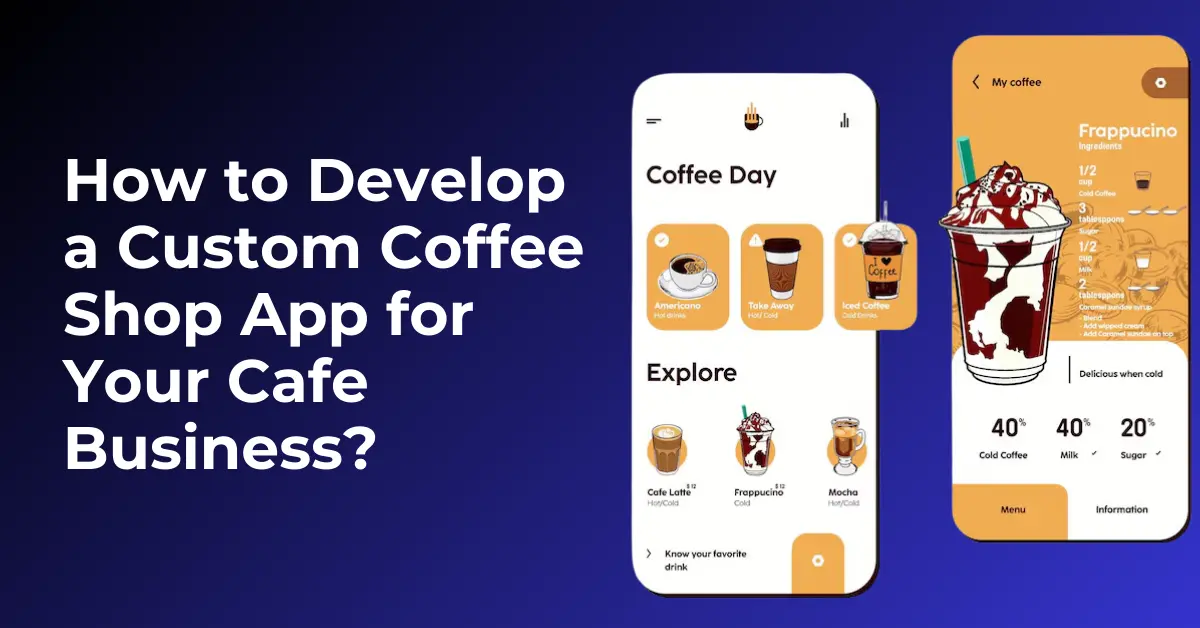In a world where smartphones dominate daily life, mobile app development has become a necessity for businesses across industries. Coffee shops, a cornerstone of modern culture, are no exception. The convenience, speed, and personalization that mobile apps offer align perfectly with the needs of coffee lovers who value both quality and efficiency.
If you’re a coffee shop owner, creating a mobile app isn’t just about keeping up with trends—it’s about offering a seamless experience that strengthens customer loyalty and increases revenue. In this comprehensive guide, we’ll explore why mobile app development for coffee businesses is vital, how to approach it effectively, and what benefits it can bring. Along the way, we’ll debunk myths, such as how to make an app for free, and provide actionable advice to get you started.
Table of Contents
Why Mobile Apps Are Transforming the Coffee Industry
The coffee shop experience has always been about more than just beverages , convenience, and indulgence. A coffee shop ordering app enhances these aspects by simplifying the customer journey. Instead of waiting in long queues or dealing with communication mishaps, customers can browse menus, customize orders, and pay with just a few taps.
Key Trends Driving Mobile App Adoption
- Demand for Convenience: In a fast-paced world, customers value the ability to order on the go and pick up their coffee without delays.
- Contactless Services: Accelerated by the pandemic, contactless ordering and payments are now an expectation rather than an option.
- Personalization: Apps can provide tailored experiences, such as recommending favorite drinks or sending birthday discounts.
- Data-Driven Insights: For business owners, mobile apps offer access to customer behavior and trends, enabling better decision-making.
By integrating mobile technology into your coffee shop, you not only meet these demands but also position your brand as innovative and customer-centric.
Features That Make a Coffee Shop App Successful
To create an app that truly resonates with your audience, focus on features that provide value. Here are some essential functionalities to consider:
1. User-Friendly Interface
Your app’s design should be intuitive and visually appealing. Customers should be able to navigate menus, customize orders, and complete transactions effortlessly.
2. Menu Customization
Coffee is deeply personal, one person’s perfect latte might include almond milk, an extra shot of espresso, and a dash of cinnamon. Allowing customers to customize their drinks ensures satisfaction.
3. Mobile Payments
Integrate secure payment options, including credit cards, digital wallets, and QR codes. This reduces friction at checkout and accommodates diverse preferences.
4. Loyalty Programs
A built-in rewards system encourages repeat visits. For example, customers could earn points for each purchase and redeem them for free drinks or discounts.
5. Push Notifications
Send timely updates about promotions, new menu items, or personalized deals. However, avoid overwhelming users with too many notifications, which can lead to app fatigue.
6. Order Tracking
Providing real-time updates on order status, from preparation to pickup, ensures transparency and reduces wait-time anxiety.
7. Location-Based Services
For businesses with multiple outlets, use GPS to direct users to the nearest location. You can also offer location-specific promotions.
By prioritizing these features, you create a coffee shop ordering app that meets customer expectations and supports your business goals.
How to Approach Mobile App Development for Coffee Shops
Developing an app requires careful planning and execution. Here’s a step-by-step guide to help you navigate the process:
Step 1: Define Your Goals
Start by asking yourself what you hope to achieve with your app. Are you looking to increase takeout orders, enhance customer loyalty, or gather valuable data? Your goals will shape the design and functionality of your app.
Step 2: Choose the Right Development Path
While some businesses explore how to make an app for free using DIY platforms, it’s important to consider the limitations. Free tools often restrict customization and scalability, which can impact the user experience. Partnering with a professional software house ensures that your app is tailored to your specific needs and can grow alongside your business.
Step 3: Focus on User Experience (UX)
The success of your app depends on how easy and enjoyable it is to use. Partner with developers who prioritize UX, ensuring smooth navigation, attractive visuals, and responsive performance.
Step 4: Test Thoroughly
Before launching, test your app extensively to identify and fix bugs. Invite a small group of customers to try the app and provide feedback.
Step 5: Launch and Market Your App
Once your app is ready, create buzz around its launch. Use social media, email campaigns, and in-store signage to inform customers. Offering an exclusive launch promotion, such as a free coffee for the first mobile order, can encourage downloads.
Step 6: Monitor and Improve
After your app goes live, track its performance using analytics. Regularly update the app to fix issues, introduce new features, and keep users engaged.
The Business Benefits of Mobile App Development for Coffee
A well-executed mobile app can deliver significant advantages for coffee businesses:
1. Enhanced Customer Experience
By simplifying the ordering and payment process, your app saves customers time and effort. This convenience fosters loyalty and repeat business.
2. Increased Revenue
Mobile apps can drive sales through upselling features, such as suggesting add-ons or larger sizes during the ordering process.
3. Operational Efficiency
Digital orders reduce in-store congestion and minimize errors, allowing staff to focus on preparing drinks and engaging with customers.
4. Valuable Data Insights
Your app can collect data on customer preferences, peak hours, and popular menu items. Use this information to optimize inventory, plan promotions, and refine your offerings.
5. Brand Loyalty
Loyalty programs and personalized interactions keep customers connected to your brand. Over time, this builds a strong community around your coffee shop.
Common Misconceptions About Mobile Apps for Coffee Shops
Despite the clear benefits, some business owners hesitate to invest in mobile app development due to misconceptions:
- “It’s too expensive.” While a custom app requires an upfront investment, the long-term ROI often outweighs the costs.
- “I can just make an app for free.” Free platforms are suitable for basic apps but may lack the features and branding needed for a professional appearance.
- “My coffee shop is too small for an app.” Even small businesses can benefit from mobile apps, especially as consumers increasingly rely on technology.
Case Study: A Small Coffee Shop’s Journey to Success
Consider the story of a local café that struggled with long lines and inconsistent sales. By launching a coffee shop ordering app, they allowed customers to place orders ahead of time, cutting wait times significantly. They also introduced a loyalty program, which increased repeat visits by 25%. Within six months, the app accounted for 40% of their total orders, proving that even small businesses can thrive with the right digital tools.
Conclusion: Why Mobile App Development for Coffee Is a Must
In the competitive coffee industry, mobile apps have become a game-changer. They enhance the customer experience, streamline operations, and provide insights that drive growth. By investing in a well-designed app, you demonstrate your commitment to meeting customer needs in a modern, efficient way.
While the temptation to make an app for free may be strong, partnering with a professional development team ensures a polished, scalable solution that reflects your brand’s values. Whether you’re a single café or a growing chain, a mobile app is an essential ingredient for success in today’s digital world.


